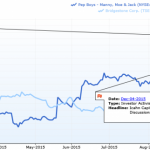After the drug pricing issue crippled its performance last year, the drug/biotech industry, except for a small correction recently, has witnessed a turnaround this year. Stocks with large market cap have done particularly well. After declining 5.2% last year, the Large Cap Pharma industry has risen 15.3% this year so far with a number of things going in its favor.
Strong quarterly results, new product sales ramp up with rising demand, successful innovation, and product line expansion, strong clinical study results, more frequent FDA approvals and continued strong performance of legacy products played a pivotal role in bringing the large-cap drug sector back on track this year.
Most drug companies with a larger market cap have seen their share price rising this year. AstraZeneca (AZN – Free Report), Novo Nordisk (NVO – Free Report), Novartis (NVS – Free Report), and Johnson & Johnson (JNJ – Free Report) have even outperformed the industry. However, a couple of large-cap pharma companies have witnessed a downside this year. We discuss them below.
Merck & Co., Inc. (MRK – Free Report)
While Merck was one of the very few companies whose shares were up last year notwithstanding the industry’s decline, it’s the other way round this year. Shares of Merck have declined 7.3% this year so far.
Merck has suffered some notable pipeline setbacks this year. In October, Merck decided not to seek approval for its CETP inhibitor anacetrapib for cholesterol management as its clinical profile was not strong enough to support regulatory filings.
Last month, the company also announced a delay in the readout from an important lung cancer study to 2019. This was due to the inclusion of overall survival as a co-primary endpoint in the KEYNOTE-189 phase III study of Keytruda in first-line lung cancer. This raised investor concern, as the delay in the readout can give competitors a chance to gain strength in the lung cancer market.














Leave A Comment